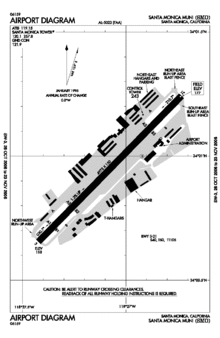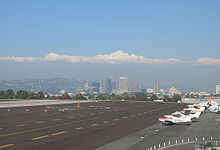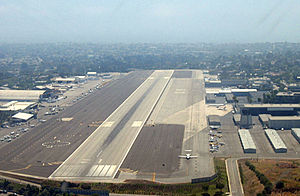- Santa Monica Airport
-
Clover Field redirects here. For the film, see Cloverfield.
Santa Monica Airport
Santa Monica Municipal Airport
IATA: SMO – ICAO: KSMO – FAA LID: SMO Summary Airport type Public Owner City of Santa Monica Location Santa Monica and Mar Vista, Los Angeles, California Elevation AMSL 177 ft / 53.9 m Coordinates 34°00′57″N 118°27′05″W / 34.01583°N 118.45139°W Runways Direction Length Surface ft m 3/21 4,973 1,516 Asphalt Helipads Number Length Surface ft m H1 40 12 Asphalt Santa Monica Airport (IATA: SMO, ICAO: KSMO, FAA LID: SMO), also known as Santa Monica Municipal Airport, is a general aviation airport located largely in Santa Monica, California, United States. The airport is located about 2 miles (3 km) from the Pacific Ocean (Santa Monica Bay) and 6 miles (10 km) north of LAX. According to the FAA's National Plan of Integrated Airport Systems for 2009–2013, it is categorized as a reliever airport.[1]
Contents
History
Originally called Clover Field, after World War I aviator lieutenant Greayer "Grubby" Clover, the airport was the home of the Douglas Aircraft company. The first circumnavigation of the world by air, accomplished by the U.S. Army with Douglas World Cruisers, took off from Clover Field on St. Patrick's day, March 17, 1924, and returned there after some 28,000 miles (45,000 km). Cloverfield Boulevard—which confuses the field's naming for a crop of green rather than a fallen soldier—is a remnant of the airport's original name. Clover Field was once the site of the Army's 40th Division Aviation, 115th Observation Squadron and became a Distribution Center after World War II. Among other important aircraft built there, Douglas manufactured the entire Douglas Commercial "DC" series of reciprocating-engine-powered airliners, DC-1 (a prototype), DC-2, DC-3, DC-4, DC-5 (only 12 built), DC-6, and DC-7. During World War II, Bolo B-18 and B-18A bombers and thousands of C-47 (military version of the DC-3) and C-54 (later the civilian DC-4) military transports were built at Santa Monica, during which time the airport area was cleverly disguised from the air with the construction of a false "town" (built with the help of Hollywood craftsman) suspended atop it.
1950s aerial view looking west On May 19, 1938, at the request of Santa Monica Postmaster Philip T. Hill (father of race car driver Phil Hill), Joanne Reid (later Jackson) became the first woman to fly the U.S. Mail from Clover Field to Burbank Airport (LAX -- then known as Mines Field -- was not yet the area's main airport) as part of National Air Mail week. She was 22. She was born in Detroit, MI on November 8, 1915 and moved to Santa Monica with her family as a young girl. After accompanying a friend in his family's plane, she became hooked on flying and began taking flying lessons at Clover Field when she was 16.
Operations
The airport has a control tower and, on average, handles 296 operations a day (for the 12 months - ended July 2011, as per the FAA's Air Traffic Activity System website).
As the Santa Monica Airport is one of relatively few general aviation airports in the nation that is surrounded on all sides by dense residential development, the City of Santa Monica aggressively enforces one of the most stringent noise ordinances in the nation. In addition to responding to the community’s noise concerns and enforcing the City’s Aircraft Noise Ordinance, which includes a maximum allowable noise level, curfew hours and certain operational limitations, Airport staff is involved in a variety of supplementary activities intended to reduce the overall impact of aircraft operations on the residential areas surrounding the Airport. The following procedures and limitations are enforced in accordance with the City’s Aircraft Noise Ordinance. Violations may result in the imposition of fines and/or exclusion from Santa Monica Airport:
• Maximum Noise Level - A maximum noise level of 95.0 dBA Single Event Noise Exposure Level, measured at noise monitor sites 1,500 feet from each end of the runway, is enforced 24 hours a day, 7 days a week. There are no additional noise monitoring stations along the flight pattern, which is routed entirely over residential neighborhoods.
• Night Departure Curfew - No takeoffs or engine starts are permitted between 11pm and 7am Monday through Friday, or until 8am on weekends. Exceptions are allowed for bona fide medical or public safety emergencies only.
• Operational Limitations - Touch-and-go, stop-and-go, and low approaches are prohibited on weekends, holidays, and weekdays from one-half hour after sunset until 7am the following day.
In addition, there are numerous recommended noise abatement procedures and limitations that have been incorporated into the Airport’s Fly Neighborly Program and included in the program’s outreach materials. For additional information visit the Airport’s web site at: http://www.smgov.net/departments/airport/
The aviation aspects of aircraft operations at the Santa Monica Airport and use of the nation’s airspace is regulated by the federal government through the Federal Aviation Administration (FAA). The City is jurisdictionally preempted by federal law from establishing or enforcing new local laws that would affect aircraft operations or the use of airspace around the Santa Monica Airport. And as a federally obligated airport, any attempt to do so by the City will certainly result in legal action taken against it by the FAA.
Typhoon is the only restaurant on the airport property with a runway view and Spitfire Grill is across on Airport Avenue. The Museum of Flying at the airport houses a collection of historic aircraft. A new facility is built on the South side of the airport and is expected to re-open at some point in the future. One of the airport's oldest buildings, next to the restored Douglas DC-3, hosts the U.S. Civil Air Patrol's Clover Field Composite Squadron 51.
Landing fees
On August 1, 2005, the Santa Monica City Council implemented a revised landing fee program (Resolution No. 9855) for all transient aircraft (those not based at the Santa Monica Airport) based on a uniform rate of $2.07 per 1000 pounds of Maximum Certificated Gross Landing Weight. Since the Santa Monica Airport receives no federal, state or local funding to operate, the landing fees fill the gap between other Airport revenue and the cost of operations.[2]
Safety concerns
The issue has gained increased attention since the increase of jet traffic in the past decade.
Pollution
Environmental impact of aviation
 Less than one mile west of Santa Monica Airport over the dense West Los Angeles, California area.
Less than one mile west of Santa Monica Airport over the dense West Los Angeles, California area.
Airport Park
Airport Park opened as an 8.3-acre (34,000 m2) public park on non-aviation lands at the southeast corner of the Airport. The new park, known as Airport Park,[3] features a synthetic turf soccer field, open green space and an off-leash dog area.
Future
The City of Santa Monica has recently initiated a process regarding the future of the airport when its settlement agreement with the FAA expires in 2015. The Santa Monica City Council has approved a course of action that will lead to the development of an inclusive public process to facilitate the visioning of the Airport’s role within the community.
The City has embarked upon a comprehensive three-phased process[4] for the development of the essential data and public dialogue to accomplish this goal. The Phase I work plan included an analysis of best practices regarding general aviation facilities and sites in relationship to local communities and corresponding potential alternative designs or uses. It all so included a financial analysis of the Airport’s economic impact and stakeholder interviews and the development of the format and materials for a comprehensive public process of workshops that will constitute Phase II. In Phase III, the studies from Phase I and the results of the public dialogue from Phase II will be presented to the City Council for consideration of potential policies and actions regarding the future of the Airport.
Accidents
- On Labor Day weekend in 1989, a P-51 Mustang crashed into a home on Wade St near Brooklake St in Mar Vista. The pilot and passenger were both injured.[5]
- In 1994, the pilot of a single-engine Piper Saratoga died when a fuel system misconfiguration led to an in-flight engine shutdown. The aircraft stalled in a subsequent 180 degree turn for a forced emergency landing and struck the ground, which resulted in a post-crash fire.[6]
- On March 28, 2001, an inexperienced pilot rented a Cessna 172 from Justice Aviation at the airport and subsequently lost control of the aircraft over the Pacific Ocean upon encountering dark, instrument meteorological conditions. Three were killed.[7]
- On November 13, 2001, the pilot of a twin-engine Cessna failed to remove the device that locks the control system for parking (to prevent wind damage) and two were killed when the aircraft overran the runway after an unsuccessful aborted takeoff.[8]
- Game-show host Peter Tomarken and his wife Kathleen died when his Beechcraft Bonanza crashed during climb-out from the airport on the morning of March 13, 2006. The Federal Aviation Administration reported that the aircraft had engine trouble and attempted to turn back before crashing into Santa Monica Bay.[9][10]
- On January 13, 2008, a home-built aircraft ran off the end of runway 21 after a brake failure, jumped over the hillside, landing on a service road. The three passengers on board were not hurt although the kit-built aircraft was damaged severely. The runway was closed for 20 minutes.
- On January 28, 2009, a single-engine SIAI-Marchetti SF-260C lost power following takeoff and attempted to return to the airport. The aircraft struck the ground on the north side of runway 21 and caught fire, killing two people on board. Paulo Emanuele, the general manager of Airliners.net, was the pilot-in-command, and his passenger was Martin Schaedel, a well-known internet entrepreneur and engineer in his twenties. After an investigation The National Transportation Safety Board determines the probable cause(s) of this accident as follows: The pilot’s failure to select the proper fuel tank for takeoff, which resulted in a loss of engine power. Contributing to the accident was the pilot's failure to maintain aircraft control while attempting a return to runway maneuver.[11][12]
- On August 2, 2009, a Rutan Long-EZ experienced engine failure after takeoff. The pilot attempted to turn back to the runway but crashed on the taxiway in the process of landing. The pilot, flying alone, was severely injured and the airplane was destroyed.[13]
- On July 1, 2010, a Cessna 152, owned by Justice Aviation, crashed into the Penmar Golf Course shortly after take-off. The pilot was killed.[14]
- On August 29, 2011, a student pilot operating a small plane owned by Justice Aviation crashed into a home at 21st St. and Navy St. after take-off. [15]
See also
- California World War II Army Airfields
- J.C. Barthel, who planned to establish "an aerial passenger service," 1922
Notes
- ^ National Plan of Integrated Airport Systems (NPIAS): 2009-2013. Federal Aviation Administration. Retrieved March 30, 2010.
- ^ http://pen.ci.santa-monica.ca.us/airport/PDF%20Files/LF%20Brochure.pdf SMO Landing Fee Program
- ^ Airport Park - Community & Cultural Services (CCS) - City of Santa Monica
- ^ http://www.smmirror.com/?ajax#mode=single&view=31809
- ^ [1]
- ^ LAX94FA198
- ^ LAX01FA129
- ^ LAX02FA028
- ^ Blankstein, Andrew (March 14, 2006). "TV Game Show Host, Wife Killed; Peter Tomarken of `Press Your Luck' was piloting a small plane that crashed into Santa Monica Bay.". LA Times Archives. http://pqasb.pqarchiver.com/latimes/access/1002508961.html?dids=1002508961:1002508961&FMT=ABS&FMTS=ABS:FT&type=current&date=Mar+14%2C+2006&author=Andrew+Blankstein&pub=Los+Angeles+Times&edition=&startpage=B.1&desc=TV+Game+Show+Host%2C+Wife+Killed%3B+Peter+Tomarken+of+%60Press+Your+Luck%27+was+piloting+a+small+plane+that+crashed+into+Santa+Monica+Bay.. Retrieved 2009-01-28.
- ^ "N16JR flight track". FlightAware. http://flightaware.com/live/flight/N16JR. Retrieved 2008-05-18.
- ^ "WPR09FA102". http://www.ntsb.gov/ntsb/brief.asp?ev_id=20090128X04223&key=1. Retrieved 4 February 2009.
- ^ Lozano, Alicia (28 January 2009). "2 men killed in crash at Santa Monica Airport are identified". Los Angeles Times. http://www.latimes.com/news/local/la-me-planecrash29-2009jan29,0,2097206.story. Retrieved 28 January 2009.
- ^ Bloomekatz, Ari (2 August 2009). "Pilot injured in small plane crash". Los Angeles Times. http://latimesblogs.latimes.com/lanow/2009/08/pilot-crashes-at-santa-monica-airport.html. Retrieved 2 August 2009.
- ^ http://www.dailybreeze.com/news/ci_15427971
- ^ http://latimesblogs.latimes.com/lanow/2011/08/small-plane-crashes-into-yard-in-santa-monica.html
References
 This article incorporates public domain material from websites or documents of the Air Force Historical Research Agency.
This article incorporates public domain material from websites or documents of the Air Force Historical Research Agency.External links
- Museum of Flying
- FAA Airport Diagram (PDF), effective 20 October 2011
- Resources for this airport:
- AirNav airport information for KSMO
- ASN accident history for SMO
- FlightAware airport information and live flight tracker
- NOAA/NWS latest weather observations
- SkyVector aeronautical chart, Terminal Procedures for KSMO
Categories:- Airports in the Greater Los Angeles Area
- Airports established in 1924
- Santa Monica, California
- Airfields of the United States Army Air Forces Technical Service Command
- Airfields of the United States Army Air Forces in California
- Airports in Los Angeles County, California
Wikimedia Foundation. 2010.


